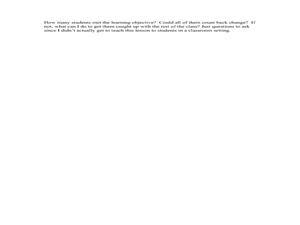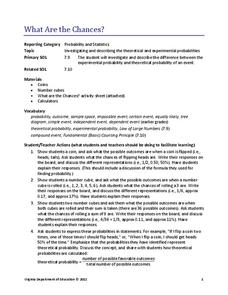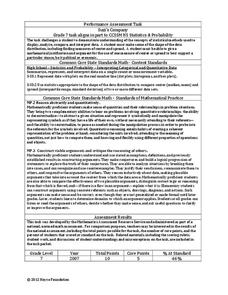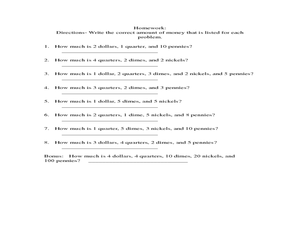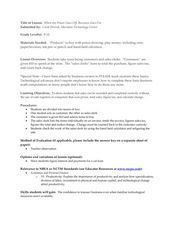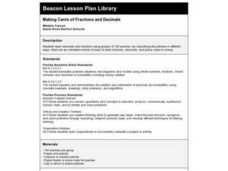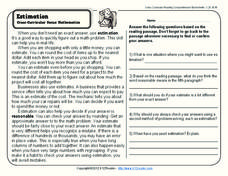Curated OER
Changing the Different Currency of Different Countries
Students change the money used in different countries into our currency. In this algebra lesson, students rewrite word problems using variables and inequalities. They label each unknown with a letter and identify the steps needed to...
Curated OER
Money Game
Fourth graders give change of one dollar. In this decimal and fractions lesson, 4th graders receive fake coins and discuss what they could purchase with them. Students go for a walk and spend one dollar and get...
Curated OER
Money and Business (Art)
Third graders investigate world currency by creating their own coin art. In this government lesson, 3rd graders examine the characteristics of different coins and create their own design for a new one. Students discuss and...
Curated OER
Building Tolerance for Poverty in Math
Students explore approximate and exact solutions. In this interdisciplinary lesson, 6th graders will be placed in 'family groups' to create a budget that is subject to random events as chosen from the 'things happen' box. This lesson...
Curated OER
Let's Find Out About Money
First graders investigate the uses and development of money as part of the study of finance. They focus upon the recognition of different coins and identify the value of each. Then students solve problems involving money and coins.
Curated OER
Let's Find Out About Money
First graders identify coins (pennies, nickels, dimes and quarters), and their attributes, including physical characteristics and value.
Curated OER
How Much is Saved?
Counting pence is great because some of the common coin values are two, five and ten. Learners assess each piggy bank and count the pence contained within. They count by 2s, 5s, and 10s depending on the coin in each bank. Tip: The...
Virginia Department of Education
What Are the Chances?
Take a chance on an informative resource. Scholars conduct probability experiments involving coins and number cubes to generate data. Compiling class data helps connect experimental probability to theoretical probability.
Inside Mathematics
Suzi's Company
The mean might not always be the best representation of the average. The assessment task has individuals determine the measures of center for the salaries of a company. They determine which of the three would be the best representation...
Practical Money Skills
Making Decisions
A set of quizzes and assessments would make a great companion to your instructional activity on making decisions and opportunity risks. Learners watch a PowerPoint before answering multiple choice questions about interest rates, saving...
Curated OER
Dollars and Sense
Fourth graders read "Starting a Business" and answer the question: "How could you design an ad to let the community know about the business described in the story?" Then, they illustrate a written ad that could be posted in the...
Radford University
Population Project
How fast does it grow? Scholars work on two tasks dealing with exponential growth, one on population growth and the second on investments. Learners research a country's population over the past century and make predictions of the current...
Curated OER
Technology - money
First graders trade coin amounts by using punch out coins. In this trading coins lesson plan, 1st graders use pennies, nickels, and dimes, and then trade them with each other in equivalent amounts. Students also complete money computer...
Curated OER
Piggin' out with Money
Third graders manage money. In this money math lesson plan, 3rd graders read Pigs Will be Pigs. Students then use manipulatives to practice adding monetary amounts and making change. Students also practice working with money on selected...
Curated OER
Money and Business
Third graders use play money to complete tasks that allow them to see if the budget they came up with works. In this budget lesson plan, 3rd graders create their own budget and test it out with the play money.
Curated OER
Money Matters
In this money matters worksheet, students match the pictures of the coins to appropriate piggy banks mark with money amounts.
Curated OER
How Much Money Do You Have?
Second graders are given 8 world problems dealing with an assortment of coins. In this money activity, 2nd graders determine the answers to each problem with 100% accuracy. Students complete a worksheet that is graded.
Curated OER
When the Power Goes Off, Business Goes On
Students participate in a scenario that involves a business with play money and a calculator. They take turns being customers and sales clerks during their simulations. This exercise assess basic math computations involved in cash...
Curated OER
Making Cents of Fractions and Decimals
Students explore decimals and fractions using groups of 100 pennies. By classifying the pennies in different ways, there are an unlimited number of ways to learn fractions, decimals, and place value in money. This is a good, hands-on...
Garden of Praise
George Washington Carver Test
This is a standard multiple-choice assessment on the life and ideas of George Washington Carver. It includes 20 questions on topics covering information about his birth and education, major career moves, teaching principles, ethics, etc.
Curated OER
Tiling Tessellations
Students explore tessellations. In this shapes and geometry lesson, students describe the attributes of many of the shapes displayed on an Elmo. Students create examples of tessellations using pattern blocks.
Practical Money Skills
Buying a Home
Guide high schoolers through the process of buying a house with a simulation lesson. As pupils learn about mortgages, renting versus buying, and home inspections, they discuss ways to make informed financial decisions and sound...
K12 Reader
Estimation
When is it a good idea to use estimation? Learn about estimation and rounding with a reading comprehension lesson. After kids read a passage about estimation, they answer five comprehension questions on the other side of the page.
Concord Consortium
Fermi Time
It's all just a matter of time. The resource provides four Fermi questions in reference to time. The questions are open-ended and require classmates to make use of estimation and dimensional analysis.



